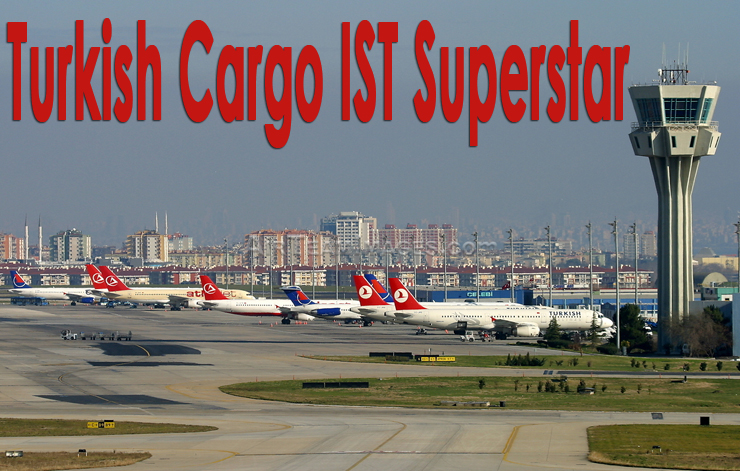| 
 If
you look at Turkish Airlines up close and personal as delegates to IATA’s
World Cargo Symposium undoubtedly are doing this week in Istanbul, what
emerges is an exciting, fast growing airline that moved 29.4 million
passengers and 313,000 tons of cargo in 2010. If
you look at Turkish Airlines up close and personal as delegates to IATA’s
World Cargo Symposium undoubtedly are doing this week in Istanbul, what
emerges is an exciting, fast growing airline that moved 29.4 million
passengers and 313,000 tons of cargo in 2010.
Operating from “The Natural Bridge
between Asia and Europe” as Istanbul is called and backed by the
Turkish Government’s proactive foreign policy, the future bodes
well as THY has bold plans in place as it steps forward in the new century.
“Our main focus for 2011 is to have
it be the year of operational productivity and quality, in addition
to increasing global brand awareness for Turkish Airlines,” said
Senior Vice President Cargo, Abdullah Soner Akkurt who was named cargo
manager earlier this year.
New aircraft are going to join the fleet,
new destinations will be opening, (Istanbul to Los Angeles non stops
were launched earlier this month) and renewal of facilities and frequency
increases are all in the works.
“We expect to achieve our 2011 target
of 35 million passengers and 380,000 tons of cargo.”
Right now Turkish Airlines is 154 Airbus
and Boeing airplanes plus five Airbus freighters and is one of the youngest
fleets in Europe, with an average age of 6.5 years.
The freighter fleet consists of four A310s
with 36 tons of capacity and one A330-200 with 70 tons of capacity.
On tap to arrive in Turkish Cargo livery
by mid-year is an additional A330F bringing the total number of freighters
to six.
“We want to expand our services
globally and to position our brand across one of the largest networks
within the airline business sector, thus creating a global footprint.
“Turkish currently operates in 26
scheduled cargo destinations with our freighters: Beirut, Cairo, Dubai,
Cologne, Tbilisi, Damascus, Amman, Tel Aviv, Almaty, New Delhi, Frankfurt,
Maastricht, Zurich, Paris, Madrid, Pristina, Milan, Algeria, Tripoli,
Casablanca, Tiran, London, Shanghai, Hong Kong, Tashkent, and Bishkek,”
Mr. Akkurt declared.
“During 2011, we are planning to
operate our A310F to Munich, Jeddah, Bucharest and Addis Ababa, and
with our second A330-200F to Dhaka, New York and Singapore.”
Turkish Airlines currently serves 172
destinations, such as Los Angeles, Shiraz, Manila, Atlanta, Malaga,
Valencia, Toulouse, Kabul, Naples, Turin, Genoa, and Basra.
“The primary focus of Turkish Cargo
is to have a 'customer-oriented approach’; to meet customer needs
and to make our shipment process clear and fast.
“We also have also recently renovated
our website www.turkishcargo.com.tr in order to meet customer demands,
and also to offer the easiest way to monitor their shipment at every
step.
“Turkish Cargo has also endorsed
and participated in the Cargo 2000 project to increase its performance
operationally and to meet customer expectations for higher service.
“In terms of business in 2010 cargo
carried from the Middle East rose 13 percent for the same period, while
cargo moved from the North African region doubled in volume compared
to the previous year.
“So this area called MENA is a very
important air cargo market and at the same time it is an emerging market.
“Turkish Airlines, paralleling Turkish
Cargo, expanded its network capability in 2009 and currently operates
in 26 cities in the region.
“As mentioned before, Turkish Cargo
also has a robust network of scheduled freighter service to Casablanca,
Algiers, Tripoli, Cairo, Tel-Aviv, Dubai, Amman, Damascus and Beirut.
“The market affords many opportunities
truly making Turkish Cargo a global business resource.”
Taking an industry view Abdullah Soner
Akkurt says that he is well aware that there remain challenges to successful
air cargo operations, such as low yields, volatile fuel prices and matching
capacity to demand.
“Being aware that our industry is
fragile, more fragile than every other service industry, we must take
intelligent steps for the future.
“Air cargo companies must be leaner,
more cost-efficient and wiser after having experienced the economic
downturn.
“The industry must exploit its advantages,
such as security, speed and reliability.
“Air cargo must be seen as a total
supply chain, together with the shipper, consignee, customs, freight
forwarder and carrier.
“Comprehensive cargo screening programs
must be used industry wide, and in a cost-efficient way, supported by
new technologies and causing little disruption to customers and operators.
“In terms of customs, there is still
need for drastic changes—to reduce origin-destinations timing
and to pair more commonly applied customs requirements with widely used
electronic data transfers.
“All this must be done in order
to make air cargo more secure, simple and reliable in the future.
“ Security will remain a main issue
for coming years.
“It’s obvious (after Yemen
late last year) that the air cargo industry is vulnerable toterrorist
attacks, so there must be a common vision in the industry in order to
have reliable security standards.”
Geoffrey |




![]() 100%
Green
100%
Green